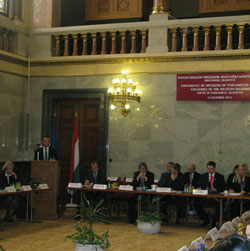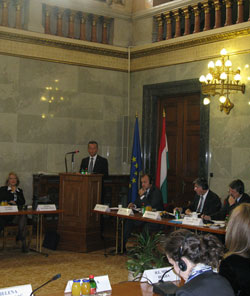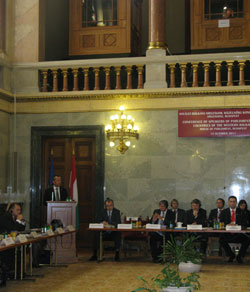Wednesday, 12 October 2011, Budapest
ADDRESS OF THE PRESIDENT VELJANOSKI AT THE FIFTH CONFERENCE OF THE SPEAKERS OF PARLIAMENTS OF COUNTRIES OF THE WESTERN BALKAN
 Esteemed colleagues,
Esteemed colleagues,
Ladies and gentlemen,
Your Excellences,
The Republic of Macedonia and its immediate neighbors share similar foreign and policy strategic determination, which is the basis for constructive, fruitful and overall bilateral cooperation, as well as cooperation in the process of integration of EU and NATO, regardless of the different degree of their integration in these institutions. The cooperation between the countries from the region itself is a visionary idea. It is the basis for optimism for better future of our nations, and in the same time announces and new cycle of our development seeking for new energy, enthusiasm and efforts.
On the other hand, at the recent forums held this year, both, the Commissioner on Enlargement, Štefan Füle and the EU High Foreign Affairs and Security Policy, Ms. Catherine Ashton, stated that a positive atmosphere for accelerating the European integrative processes is created, underlining the progress achieved by the Western Balkan countries in this year.
It will be positive if this mutual positive progress, which was achieved in the past period, is accompanied today- when the progress report is being published- by a positive proactive recommendation and policy by Brussels. This recommendation will be founded on a kind of strategic understanding and actual solidarity and towards the candidates for membership through the practical acceleration of the integrative dynamics and the opening of the accession negotiations with the Union.
The Republic of Macedonia and the Union have a history of deepened and intensive cooperation imbedded in the Macedonia’s strategic goal for integration in the European Family. This cooperation is in accordance with the Stabilization and Association Agreement. As it is well known, after gaining the candidate status in 2005, the achieved reforms and the degree of harmonization of the national legislation and the Acquis resulted with a recommendation of the European Commission for opening accession negotiations in October 2009, which was renewed in November 2010. There is no consensus for the adoption of the recommendation for opening negotiations with the Republic of Macedonia because of the Greek opposing that is conditioning its approval with finding a solution of the name issue. In this context, the proposal of the Commission for adoption of Decision by the Council for transfer into the so called second phase of the implementation of the Agreement of October 2009 is important; the adoption is postponed because of political reasons. Even more, at the beginning of 2011, the Trade Association between the Republic of Macedonia and EU was established, in accordance with the provisions of the Agreement.
 The Republic of Macedonia, on its side, has maximized the efforts to solve the bilateral issue with Greece, actively and constructively participating in the discussions under the auspices of the United Nations and through frequent bilateral contacts with the Greek side, and remains fully determined on this issue to be solved as soon as possible, without putting into question the national, cultural and linguistic identity of the Macedonian nation.
The Republic of Macedonia, on its side, has maximized the efforts to solve the bilateral issue with Greece, actively and constructively participating in the discussions under the auspices of the United Nations and through frequent bilateral contacts with the Greek side, and remains fully determined on this issue to be solved as soon as possible, without putting into question the national, cultural and linguistic identity of the Macedonian nation.
The membership in the European Union means many thorough reforms. The Republic of Macedonia understands this process of reforms and harmonization with the Acquis as a need to reach the European standards and raising the competitive power of our economy. The Assembly, as a true representative of the citizens, has a significant role in the introduction of the principles, standards and values of the European corpus in the everyday lives. I would like to underline that we have made a significant step forward in the adoption and implementation of the European standards and that we are prepared to share our experiences with all the countries from the Region. In other words, the Republic of Macedonia continuously delivers concrete and visible results in the key areas of reforms- especially in: state administration, judiciary, fight against corruption, implementation of the Ohrid Framework Agreement, harmonization with the Acquis and improvement of the implementation of the laws and economic reforms. The European Commission will confirm, for the third time, that the European principles, standards and directives and becoming part of our everyday lives and are being implemented in our legal system. I believe in the basic principles which the Union is founded on and I expect the Council of Ministers of EU to respect these principles and the Republic of Macedonia to receive a date on opening accession negotiations.
The Republic of Macedonia participated in the Common Foreign and security Policy of EU on the basis of its political determination, to share the goals and the priorities of this significant common policy before the membership in the Union, aiming to contribute in the promotion of the peace and the stability on global level and building peace and post-conflict stabilization in the crisis regions.
The Republic of Macedonia fully contributes in the newly established regional initiative, a meeting of the Speakers of Albania, Macedonia Montenegro and Kosovo. The main message from this year’s meeting was active and joint coordination of the European and Euro- Atlantic integration processes strengthened by the regional economic tendency to promote the investment capacities and infrastructural conditions.
The relations and cooperation of the Republic of Macedonia and its immediate neighbors (Albania, Bulgaria, Greece, Serbia and Kosovo) is one of the key pillars of its foreign policy. The good neighborly relations and friendship based on the principles for respect of the territorial integrity and sovereignty of all countries of the Region, emphasizing the preparedness for cooperation in many areas of mutual interest, are reflected on the intensive contacts on bilateral, regional and multilateral plan in all levels- stakeholders, initiatives creating assumptions for overall prosperity of the citizens of these countries.
The economic cooperation, which is being intensified by year, is below the possibilities and the interests with all listed countries affected by the world economic and financial. The special interest and the initiatives are focused on the infrastructure and energy projects.
The Republic of Macedonia keeps its principle determination- constructive dialogue, mutual trust; understanding and respect are the mechanisms to find solutions for all issues in the relations with our neighbors, in direction of achievement of permanent stability and security in the Region.
 The peace and the stability in this region have been wanted for a while. These are the basis for stabile and healthy societies. Misunderstanding, prejudice, intolerance should irreversibly remain in the past. In our regional cooperation, we should start from the fact that there are more unifying rather than dividing issues. We have a lot to share as a common civil benefit and heritage. These issues of reconciliation should become the foundation of the good connection between different cultures, nations and religions. Successful solution of this complicated task has a special meaning for the Balkan states as well as for Europe as a whole. We are convinced that the Republic of Macedonia and other countries from the region have capacities to achieve this. This is the only path, where, in a reasonable period of time, all countries of the region will join our neighbors who have become member states, in other words to institutionally become part of the European family. We belong to Europe- geographically, culturally and as civilizations.
The peace and the stability in this region have been wanted for a while. These are the basis for stabile and healthy societies. Misunderstanding, prejudice, intolerance should irreversibly remain in the past. In our regional cooperation, we should start from the fact that there are more unifying rather than dividing issues. We have a lot to share as a common civil benefit and heritage. These issues of reconciliation should become the foundation of the good connection between different cultures, nations and religions. Successful solution of this complicated task has a special meaning for the Balkan states as well as for Europe as a whole. We are convinced that the Republic of Macedonia and other countries from the region have capacities to achieve this. This is the only path, where, in a reasonable period of time, all countries of the region will join our neighbors who have become member states, in other words to institutionally become part of the European family. We belong to Europe- geographically, culturally and as civilizations.
The Republic of Macedonia is a responsible and dedicated member of the international community. As an independent and sovereign country, since the beginning, the Republic of Macedonia paid great attention to the regional cooperation and good neighborly relations. The multilateral regional cooperation is a general tendency in the development of the international relations, as part of the globalization. Our region entered this process later, but has compensated the time through many new initiatives, processes and meetings. The parliamentary cooperation should strongly contribute in the creation of a new atmosphere in the mutual relations, certainly supported by the general public, the business community and the civil society.
I expect that the recommendations for opening accession negotiations to be reaffirmed today, for the third time. Our key and immediate priority remains the opening of accession negotiations with the Union, as soon as possible.
If we summarize all recommendations, the evaluation is that there is no apathy from the enlargement- according to the statements from Brussels; one can conclude that the accession negotiations for Croatia returned the credibility to the enlargement process, and the positive steps towards opening the accession negotiations for Macedonia, Serbia and Montenegro are being marked. Today, I expect the Commissioner for Enlargement, Mr. Füle to reaffirm these remarks and to give a new impetus for the step forward in the process of European integration.
Thank you for your attention.